Can Flight Simming Get Anymore Serious Than This?



This is an Australian home made cockpit replicating the 747!
More info and photos at http://www.hyway.com.au/747/
This blog is a portal to share information about the use of simulations and gaming in education.




From the website, "Google and teachers have a similar objective: to help people build knowledge by providing greater access to useful information. Google recognizes the central role teachers play in breaking down the barriers between people and information, and we support educators who work each day to empower their students and expand the frontiers of human knowledge. The Google Teachers' Newsletter is one of the ways we're working to bolster that support and explore how Google and educators can work together. "
This annual event is now in its third year. Promising to be better than ever, the event will draw on suggestions and requests from the ICT Learning Innovation Centre Community to offer a wide range of diverse workshops catering for all levels from beginner to advanced. The day will consist of a number of hands on and information sessions designed to equip teachers with the knowledge and skills required to effectively integrate ICT into their daily classroom practices.
The ICT Learning Centre in QLD is offering a 1 day game making workshop.
Whislt the closing date has now closed for this, I think it's an intersting bit of food for thought that gaming and learning is being seriously looked at....
This is abit like the MD Choice I focussed on earlier but a bit more fun.
Now this is apretty cool site!
Can you save the patient?
Check them out at http://www.mdchoice.com/cyberpt/cyber.asp
This virtual experiment is designed to let the student measure the relation between muzzle velocity (which determines projectile energy), gravitational potential and the effects of frictional drag caused by wind speed blowing opposite to the direction the projectile is moving in.
This is without a doubt the most important and most educational simulator I have ever come across! It taught me a thing or two....


DiGRA is the association for academics and professionals who research digital games and associated phenomena. It encourages high-quality research on games, and promotes collaboration and dissemination of work by its members
Disaster Dynamics-Hurrican Landfall
Interestin artcile titled, "What's wrong with serious games?"


The manufacturer also has some other intersting simulations under development- check them out at http://www.breakawayltd.com/
Intersting site from New York, Gotham Gazette features two games/simulations-
Although American, this might be of interst to some....
Here's a simulation with a difference! http://www.educationalsimulations.com/products.html
Check this link out to what appears to be a really fascinating learning tool for engineers...
From the website-
Virtual U models the attitudes and behaviors of the academic community in five major areas of higher education management:
Virtual U players select an institution type and strive for continuous improvement by setting, monitoring, and modifying a variety of institutional parameters and policies. Players are challenged to manage and improve their institution of higher education through techniques such as resource allocation, minority enrollment policies, and policies for promoting faculty, among others. Players watch the results of their decisions unfold in real- time. A letter of review from Virtual U's board is sent every "year," informing players of their progress.
Check it out at http://www.virtual-u.org/index.asp
A possibly interesting seminar is coming up in Melbourne titled, "A Productive Approach to Video Games, Learning & School", Saturday 19th August, 2006
Flood Ranger is an educational flood management game.
I've been contacted by a few people recommending a few more add ons and extras for Microsoft Flight Simulator....
Interesting discussion paper on the use of an interactive business simulator.
Food for thought from Robert E. Morgan
Ron Gross wrote an interesting article which talks about the use of games and simulations in adult education.
Mark Piper sent through the following link today to access more resources for the use of GameMaker in senior years at school- might be of interest....
Check out http://kls.monroe.k12.fl.us/TECHTOYS05/sim_city.htm



Ever wanted to get an understanding of how the Office of Film and Literature come about their classifications?
What could possibly be an interesting and thought provoking breakfast workshop has been scheduled in Melbourne, titled, "Emerging Ideas in Instructional Design; Games in e-Learning".
In response to some of the information from the report listed below (Gameplay 2005) an intersting response from the Sydney Morning Herald-
Check out this report from the Interactive Entertainment Association of Australia
Can Google Earth be used while playing Warcraft III?
Apple have produced a very interesting site with some fascinating food for thought about the way kids are learning today....
Very intersting article from Wired magazine
http://www.discoverylearning.com/